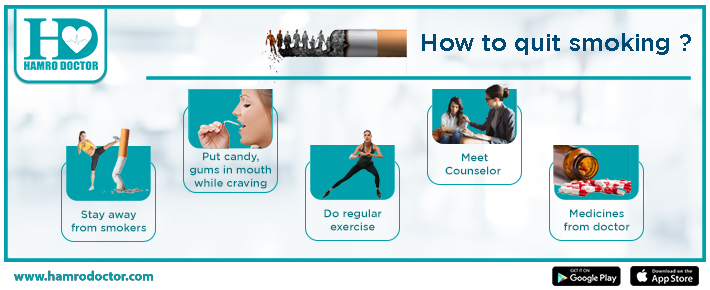CT- scan and MRI centers in Kathmandu
6 November, 2020CT- scan and MRI centers in Kathmandu...
Read More
Cigarette smoking is the leading preventable cause of mortality and is estimated to cause over seven million deaths worldwide each year. Up to one-half of all regular smokers can be expected to die from a tobacco-related illness. The most important causes of smoking-related mortality are atherosclerotic cardiovascular disease, lung cancer, and chronic obstructive pulmonary disease (COPD). Smokers who quit smoking reduce their risk of developing and dying from tobacco-related diseases.
Quitting smoking dramatically improve your health and help you live longer. It lowers your risk of heart disease, lung disease, kidney failure, infection, and cancer. Thus, smoking cessation is associated with a mortality benefit for both men and women of all ages. Stopping smoking before age 40 is associated with a larger decline in premature mortality than stopping at a later age. In addition, it also lowers your chances of getting osteoporosis, a condition that makes your bone weak, can help your skin look younger and reduce the chances that you will have problems with sex.
Since tobacco use is both
learned behavior and physical addiction to nicotine for the majority of smokers, the most effective way to promote smoking cessation is to combine both behavioral and pharmacologic therapies, which have a higher quit rate than either therapy alone.
As we all know that any quitting any habit is not easy, and it can take several tries to completely quit. But help and support are available. Quitting smoking will improve your health no matter how old you are, even if you have smoked for a long time. However, there might be various withdrawal symptoms that you may get in the beginning to start the journey. These symptoms are:
These symptoms can be hard to deal with, which is why it can be so hard to quit. But medicines can help. Some people who stop smoking become temporarily depressed. Some people need treatment for depression, such as counseling or medicines, or both.
Most people who smoke find it difficult to quit; assistance is available from several sources. Health care providers have access to self-help materials and can help select a quit date, provide contact information for local support groups, and prescribe nicotine replacement treatment if needed.
To quit smoking, you can:
Get regular exercise: Any type of physical activity, even gentle forms of movement, is good for your health. Physical activity can also help reduce stress.
Stay away from smokers and places that make you want to smoke. If people close to you smoke, ask them to quit with you or avoid smoking around you.
Carry gum, hard candy, or something to put in your mouth. If you get a craving for a cigarette, try one of these instead.
Don't give up, even if you start smoking again. It takes most people a few tries before they succeed.
You can meet with a counselor in one-on-one sessions or as part of a group. There are other ways to get counseling, too, such as over the phone, through text messaging, or online.

There are different medication which can help people to quit smoking. These medications should be taken under the supervision of doctors. These medications are:
Nicotine replacement therapy: Nicotine is the main drug in cigarettes and the reason they are addictive. These medicines reduce your body's craving for nicotine. They also help with withdrawal symptoms.
There are different forms of nicotine replacement, including skin patches, lozenges, gum, nasal sprays, and inhalers. Most can be bought without a prescription. Also, health insurance might cover some or all of the cost.
Varenicline: Varenicline is a prescription medicine that reduces withdrawal symptoms and cigarette cravings. Varenicline can increase the effects of alcohol in some people. It's a good idea to limit drinking while you're taking it, at least until you know how it affects you. Even if you are not yet ready to commit to a quit date, varenicline can help reduce cravings. This can make it easier to quit when you are ready.
Bupropion: Bupropion is a prescription medicine that reduces your desire to smoke. It is also available in a generic version, which is cheaper than the brand name medicines. Doctors do not usually prescribe bupropion for people with seizures or who have had seizures in the past. It might also be helpful to combine nicotine replacement with bupropion or varenicline
Sometimes people wonder if using electronic cigarettes, or "e-cigarettes," can help them quit smoking. Using e-cigarettes is also called "vaping." Doctors do not recommend e-cigarettes in place of medicines and counseling. That's because e-cigarettes still contain nicotine as well as other substances that might be harmful. It's also not clear how they can affect a person's health in the long term. Read more about if e-cigarettes are harmful or not in this blog.
Leave a comment